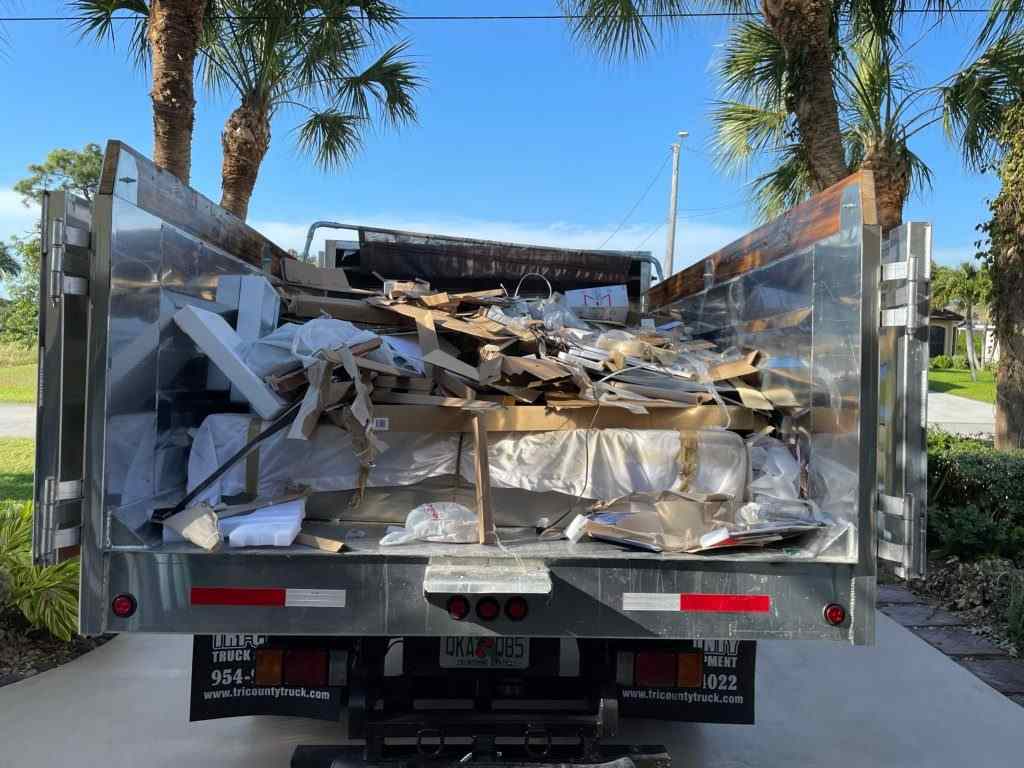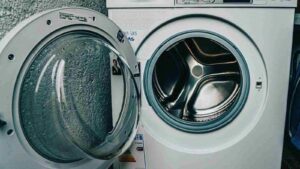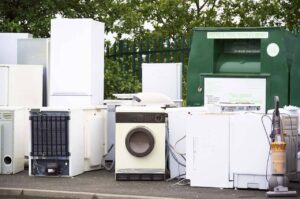In Michigan, the journey of old appliances post-removal encapsulates a comprehensive and environmentally conscious process. Once removed from homes or businesses, these appliances undergo meticulous dismantling at specialized recycling facilities across the state. Through advanced technologies, hazardous components are safely extracted, while valuable materials like metals and plastics are recovered for reuse. Concurrently, donation programs provide an avenue for extending the lifespan of appliances by redistributing them to individuals or families in need. Michigan’s commitment to sustainable waste management is evident in its multifaceted approach, which aims to minimize environmental impact while promoting resource conservation and community welfare. Michigan’s dedication to sustainable waste management extends beyond mere disposal, encompassing a holistic approach to the lifecycle of old appliances. From the initial removal process to the final destination, the state emphasizes responsible handling and recycling practices. Specialized facilities ensure that appliances are disassembled with precision, separating recyclable materials from hazardous components. Furthermore, donation programs offer a second chance to appliances by facilitating redistribution to those who can benefit from them. This comprehensive strategy not only minimizes the burden on landfills but also promotes resource conservation and social welfare within Michigan communities. It reflects a collective commitment to environmental stewardship and sustainable living practices throughout the state.
After Removal: The Sustainable Journey of Old Appliances in Michigan
After A&B Junk Removal services whisk away your old appliances in Michigan, embark on their eco-friendly journey of recycling and repurposing.

Recycling Process: Transforming Old Appliances in Michigan
In Michigan, the recycling process for old appliances removal services involves several steps to ensure environmental sustainability. Once appliances are collected from homes or businesses, they are typically transported to specialized recycling facilities equipped to handle various types of appliances, including refrigerators, washing machines, dryers, and more. At these facilities, appliances undergo a thorough dismantling process to separate materials such as metal, plastic, glass, and electronic components. These materials are then sorted and processed for recycling. Metal components, for example, are melted down and reused in the manufacturing of new products, while plastics may be recycled into other plastic items or converted into energy through processes like waste-to-energy. Additionally, hazardous materials such as refrigerants and oils are safely removed from appliances to prevent environmental contamination. Michigan adheres to strict regulations regarding the disposal of hazardous waste, ensuring that these substances are handled and disposed of properly. By recycling old appliances, Michigan not only reduces the burden on landfills but also conserves valuable resources and reduces energy consumption associated with manufacturing new appliances from raw materials.
Environmental Impact: Disposal Methods for Old Appliances in Michigan
Understanding the environmental impact of old appliance disposal is crucial in Michigan. Traditional disposal methods, such as landfilling, can have significant negative consequences for the environment. When appliances end up in landfills, they can release harmful chemicals and greenhouse gases as they decompose, contributing to air and water pollution as well as soil contamination. Moreover, appliances contain valuable materials that could be recovered and reused, further emphasizing the importance of proper disposal methods. To mitigate these environmental risks, Michigan promotes alternative disposal methods such as recycling, repurposing, and donation programs. By diverting appliances from landfills and encouraging recycling, Michigan aims to minimize its ecological footprint and promote a more sustainable approach to waste management. Additionally, public awareness campaigns and educational initiatives help residents and businesses understand the importance of responsible appliance disposal and the potential environmental benefits of recycling. Through these efforts, Michigan continues to work towards reducing the environmental impact of old appliance removal and disposal across the state.
Salvage and Repurpose: Alternatives to Appliance Disposal in Michigan
Salvaging and repurposing old appliances offer viable alternatives to traditional disposal methods in Michigan. Salvage operations involve identifying reusable components or parts from discarded appliances and refurbishing them for resale or reuse. This process not only extends the lifespan of appliances but also reduces the demand for new products, thereby conserving resources. In Michigan, salvage yards and specialized refurbishment centers play a crucial role in salvaging appliances, ensuring that usable parts are salvaged and repurposed whenever possible. By salvaging and repurposing appliances, Michigan contributes to the circular economy by reducing waste and promoting resource efficiency. Furthermore, repurposing old appliances involves creatively transforming them into new functional or decorative items. DIY enthusiasts, artists, and craftsmen in Michigan often repurpose old appliances into unique pieces of furniture, artwork, or other household items. This not only adds aesthetic value but also prevents appliances from ending up in landfills prematurely. Repurposing initiatives in Michigan encourage creativity and innovation while promoting sustainable practices. By exploring salvage and repurpose options, Michigan residents can actively participate in reducing waste and minimizing the environmental impact of old appliance disposal.
Responsible Disposal: Understanding Michigan’s Regulations on Old Appliances
Responsible disposal of old appliances in Michigan involves compliance with state regulations and guidelines to ensure proper handling and treatment of hazardous materials. Michigan has established laws and regulations governing the disposal of appliances, particularly those containing hazardous components such as refrigerants, mercury switches, and electronic waste. These regulations require proper containment, transportation, and treatment of hazardous materials to prevent environmental contamination and protect public health. Additionally, Michigan prohibits the illegal dumping of appliances and imposes penalties for non-compliance with disposal regulations. To facilitate responsible disposal, Michigan provides resources and guidance to residents, businesses, and waste management facilities. This includes information on designated collection sites, recycling centers, and authorized disposal methods for old appliances. Public awareness campaigns and educational programs also play a crucial role in promoting responsible disposal practices and raising awareness about the environmental impact of improper disposal. By adhering to Michigan’s regulations on old appliance disposal, individuals and organizations contribute to environmental conservation and help preserve the state’s natural resources for future generations.
E-Waste Management: Handling Electronic Appliances in Michigan
E-waste, including electronic appliances like computers, televisions, and microwaves, presents unique challenges in disposal and recycling due to their complex composition and hazardous materials. In Michigan, e-waste management efforts focus on safely handling and recycling these appliances to prevent environmental contamination and health risks. Specialized e-waste recycling facilities in the state are equipped with advanced technologies to dismantle electronic appliances and recover valuable materials such as metals, plastics, and rare earth elements. Through this process, Michigan not only reduces the burden on landfills but also conserves resources and minimizes the environmental impact of e-waste disposal. Additionally, Michigan encourages the proper disposal of electronic appliances through e-waste collection events and programs. These initiatives provide residents and businesses with opportunities to dispose of their old electronic appliances responsibly, often free of charge. By participating in e-waste recycling programs, individuals contribute to the sustainable management of electronic waste and help mitigate the environmental and health risks associated with improper disposal. Moreover, public education campaigns raise awareness about the importance of e-waste recycling and inform communities about available resources for proper disposal in Michigan.
Donation Programs: Giving New Life to Old Appliances in Michigan Communities
Donation programs offer a sustainable alternative to appliance disposal by providing opportunities to extend the lifespan of old appliances through reuse. In Michigan, various charitable organizations, nonprofits, and community groups operate donation programs that accept gently used appliances for redistribution to individuals and families in need. These programs not only help divert appliances from landfills but also support underserved communities by providing access to essential household items. By donating old appliances, individuals in Michigan contribute to social welfare initiatives and promote a culture of giving within their communities. Furthermore, appliance donation programs in Michigan often partner with local businesses, government agencies, and other stakeholders to facilitate the collection, refurbishment, and distribution of donated appliances. This collaborative approach maximizes the impact of donation efforts and ensures that appliances are allocated to those who need them most. Additionally, some donation programs offer tax incentives or deductions for donors, providing further encouragement to participate in these initiatives. Through appliance donation programs, Michigan fosters a sense of community engagement and solidarity while addressing environmental and social challenges associated with appliance disposal.
Disassembly and Recycling Centers: Where Old Appliances Go in Michigan
Disassembly and recycling centers play a pivotal role in the management of old appliances in Michigan. These specialized facilities are equipped with the necessary infrastructure and expertise to handle various types of appliances, including refrigerators, air conditioners, washing machines, and more. Upon arrival at these centers, appliances undergo meticulous disassembly processes to separate different components and materials. Skilled technicians carefully extract valuable materials such as metals, plastics, glass, and electronic components for recycling. This disassembly process not only ensures efficient resource recovery but also minimizes the environmental impact of appliance disposal by diverting materials from landfills. In Michigan, disassembly and recycling centers adhere to strict environmental regulations and safety standards to protect workers and prevent pollution. Hazardous materials, such as refrigerants, oils, and mercury-containing switches, are safely removed and disposed of according to state and federal guidelines. By utilizing advanced technologies and sustainable practices, disassembly and recycling centers in Michigan contribute to the circular economy by transforming old appliances into valuable secondary raw materials. Moreover, these facilities often collaborate with local governments, businesses, and nonprofit organizations to promote responsible appliance recycling and environmental stewardship within the community.
Resource Recovery: Extracting Value from Discarded Appliances in Michigan
Resource recovery initiatives in Michigan focus on extracting maximum value from discarded appliances through efficient recycling and material recovery processes. These initiatives recognize that old appliances contain valuable resources that can be reused or repurposed, thus reducing the need for virgin materials and minimizing environmental impact. In Michigan, resource recovery efforts encompass various strategies, including advanced sorting technologies, material separation techniques, and innovative recycling methods. Through these efforts, valuable materials such as metals, plastics, glass, and electronic components are recovered from discarded appliances and diverted from landfills. Moreover, resource recovery programs in Michigan emphasize the importance of sustainable practices and environmental responsibility. By promoting circular economy principles, these programs aim to close the loop on resource consumption and waste generation, creating a more sustainable and resilient economy. Additionally, resource recovery initiatives often collaborate with industry stakeholders, government agencies, and academic institutions to foster innovation and research in recycling technologies. Through continuous improvement and collaboration, Michigan strives to enhance resource recovery processes and maximize the environmental and economic benefits of appliance recycling.
Consumer Responsibility: Options for Sustainable Appliance Disposal in Michigan
Consumer responsibility plays a crucial role in sustainable appliance disposal practices in Michigan. Individuals and households are encouraged to consider environmentally friendly options when disposing of old appliances. One option is to utilize manufacturer or retailer take-back programs, where consumers can return old appliances to the manufacturer or retailer for proper disposal or recycling. Many manufacturers participate in these programs as part of their commitment to environmental stewardship and product stewardship initiatives. By returning appliances to the manufacturer, consumers ensure that the products are handled and recycled responsibly, reducing the environmental impact of disposal. Another option for consumers in Michigan is to explore community recycling events or drop-off locations for old appliances. Many municipalities and waste management authorities organize periodic collection events or provide designated drop-off sites where residents can dispose of appliances for recycling. These initiatives make it convenient for consumers to dispose of old appliances responsibly while also promoting community engagement and environmental awareness. Additionally, some municipalities offer curbside appliance recycling programs as part of their regular waste collection services, further encouraging residents to participate in sustainable disposal practices. By exercising consumer responsibility and choosing sustainable disposal options, individuals can contribute to the conservation of resources and the protection of the environment in Michigan. Exploring the common appliances accepted by removal services in Michigan sheds light on what happens to your old appliances after removal, highlighting the importance of responsible disposal practices.

Innovations in Appliance Recycling: Michigan’s Efforts Towards a Greener Future
Michigan is at the forefront of innovation in appliance recycling, continually seeking new technologies and methods to improve the efficiency and sustainability of the recycling process. One area of innovation is the development of advanced recycling technologies that enable the extraction of valuable materials from old appliances with greater precision and efficiency. These technologies may include robotic sorting systems, automated disassembly equipment, and advanced material separation techniques. By investing in innovation, Michigan aims to enhance resource recovery rates and reduce the environmental footprint of appliance recycling. Furthermore, Michigan is actively exploring opportunities for circular economy initiatives in the appliance sector. This involves promoting the design and manufacture of appliances with recyclability and sustainability in mind, as well as encouraging product stewardship throughout the lifecycle of appliances. By collaborating with manufacturers, retailers, and other stakeholders, Michigan seeks to create a closed-loop system where old appliances are recycled into new products or components, minimizing waste and conserving resources. Through these innovative approaches, Michigan is paving the way towards a greener future, where appliance recycling plays a central role in achieving environmental sustainability and economic prosperity.
FAQs
Q: What happens to my old appliances after removal in Michigan?
A: In Michigan, old appliances are typically taken to specialized recycling facilities. These facilities dismantle the appliances, separating materials like metal, plastic, and electronics for recycling. Hazardous substances, such as refrigerants, are safely extracted. The recovered materials are then reused in manufacturing or converted into energy through processes like waste-to-energy.
Q: Can I donate my old appliances in Michigan?
A: Yes, there are numerous donation programs in Michigan that accept gently used appliances. These programs redistribute appliances to individuals or families in need. By donating, you not only extend the lifespan of your appliance but also contribute to social welfare initiatives within your community.
Q: Are there alternatives to appliance disposal in Michigan?
A: Absolutely. Salvaging and repurposing old appliances are popular alternatives to disposal. Salvage yards and refurbishment centers in Michigan identify reusable parts, refurbishing them for resale or reuse. Additionally, repurposing initiatives creatively transform appliances into new functional or decorative items, diverting them from landfills.
Q: How does Michigan handle e-waste from old appliances?
A: Michigan manages e-waste, including electronic appliances, through specialized recycling facilities. These facilities dismantle appliances, recovering valuable materials like metals and plastics. E-waste collection events and programs encourage proper disposal, mitigating environmental and health risks associated with electronic waste.
Q: What role do disassembly and recycling centers play in Michigan?
A: Disassembly and recycling centers in Michigan handle old appliances, meticulously separating materials for recycling. These centers adhere to environmental regulations, safely removing hazardous substances. Advanced technologies ensure efficient resource recovery, contributing to a circular economy and minimizing the environmental impact of appliance disposal.
Conclusion
In conclusion, the fate of old appliances in Michigan is a testament to the state’s commitment to environmental sustainability and responsible waste management. Through a combination of recycling, donation programs, and innovative approaches, Michigan ensures that discarded appliances are diverted from landfills and repurposed for beneficial use. Specialized recycling facilities dismantle appliances, recovering valuable materials while safely disposing of hazardous substances. Donation programs provide a lifeline for those in need, extending the lifespan of appliances and fostering community welfare. Meanwhile, ongoing efforts in innovation and resource recovery pave the way for a greener future, where old appliances play a vital role in conserving resources and minimizing environmental impact. In Michigan, the journey of old appliances post-removal underscores a multifaceted approach to waste management. From the moment appliances are collected, they embark on a path of recycling and repurposing, driven by stringent regulations and community-driven initiatives. Specialized recycling facilities meticulously dismantle appliances, salvaging valuable materials like metals and plastics while ensuring safe disposal of hazardous components. Concurrently, donation programs provide a second life for appliances, benefitting those in need while diverting items from landfills. Collaborative efforts between government, industry, and communities bolster innovation in recycling technologies, fostering a circular economy ethos. Ultimately, Michigan’s holistic approach to appliance disposal reflects a commitment to sustainability, resource conservation, and community welfare.




